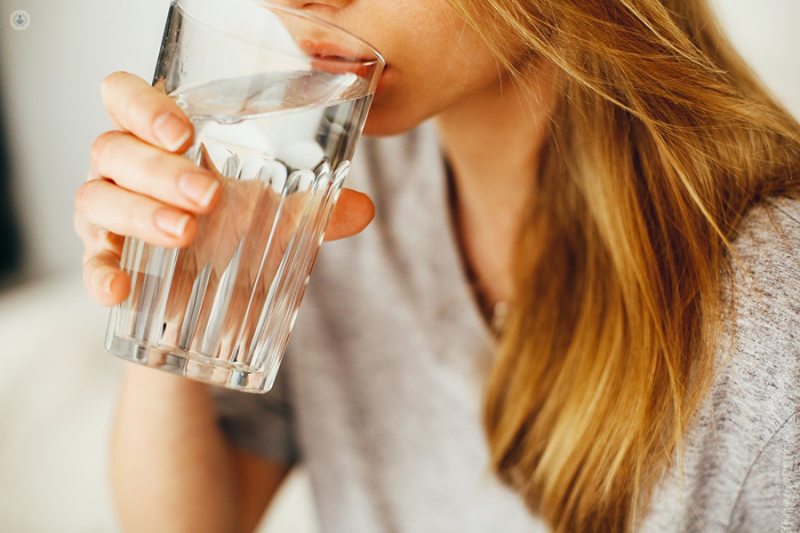Can drinking water prevent kidney stones and UTIs?
Written by:Kidney stones and urinary tract infections are painful. Once you get one your chances of getting another increases. This is why – as consultant urologist Mr Rono Mukherjee argues – prevention is better than cure, and the best thing you can do is drink more water. This article looks at why kidney stones and UTIs occur and why drinking more water is so effective.

Kidney stones and urinary tract infections (UTIs) have a massive impact on people’s quality of lives. These vary from the constant need to use the toilet to severe pain, high temperatures and even sepsis resulting in hospital admissions. I would like to give you a brief background on kidney stone disease and UTIs, before highlighting how and why increasing your intake of water can help prevent stones and infection.
Background kidney stones
The incidence of kidney stone disease is on the rise in the UK. There are many factors such as family history (some people are genetically more prone to forming stones) as well as pre-existing conditions such as diabetes.
A major contributory factor however is the effect of our “modern” western diet linked with rising obesity. Diets rich in saturated fat, animal protein, refined sugar and salt (processed foods) increase the risk of crystals forming in the kidney which can join together and form stones.
This process is exacerbated by poor water intake / dehydration (e.g. excess caffeine and alcohol). This means that all stone-formers should drink plenty of fluid (particularly water), so that their urine is diluted to lower the risk of crystal and stone formation.
Patients who have already had a stone have a greater risk of another stone later in life. As a general rule, if you have had a stone, there is a 50% chance that you will form another one within the next 10 years.
Background UTIs
UTIs (urinary tract infections) are bacterial infections of the renal tract i.e. kidneys, bladder, prostate, testes, that cause symptoms.
The most common presentation is cystitis – an infection of the bladder. These can particularly bothersome especially when recurrent.
Risk factors include:
- Gender – it mostly affects women in their 20s and post-menopausal (20-25% of women will have more than one UTI in their lifetime). Women are more likely to get UTIs than men in part because their urethra is shorter, meaning it is easier for bacteria to travel into the bladder.
- Medical conditions – such as diabetes, and in men, bladder outlet obstruction or enlarged prostate.
Untreated UTIs can result in infection “ascending” to the kidneys, resulting in a severe kidney infection (pyelonephritis) which normally needs an admission to hospital for prompt intravenous antibiotics.
As a rule, recurrent UTIs in women (two proven infections in six months, or three in a single year) and a single UTI in men require investigations by an urologist.
Prompt treatment with antibiotics is usually required, although recurrent treatment run the risk of antibiotic resistance, hence the need for conservative preventative measures. These include wiping “front to back”, and voiding before and after intercourse in women, and getting investigated and treated for prostate disease in men.
The role of water intake in prevention
Put simply, increased water flushes out stone crystals and bacteria from the urinary tract.
In terms of preventing kidney stones, The British Association of Urology guidelines state that:
“ The most important measure is to increase your daily fluid intake. It is best to drink tap water, and you should drink enough to produce a urine output of 2 to 2½ litres (4 to 5 pints) each day. This involves drinking a lot of fluid; it is, therefore, best to drink continuously throughout the day, rather than going from periods of dehydration to drinking lots in one go. There is no need to drink expensive bottled water: tap water is just as good.”
In addition, drinking fresh lemon or orange juice can increase citrate and alkaline levels in the urine, which can prevent most types of stones e.g. calcium oxalate and urate (although not kidney stones as a result of infection).
In terms of preventing UTIs, drinking more fluids increases the rate of flushing of bacteria from the bladder (“peeing them out” and emptying the bladder), and in doing so reduces the concentration of bacteria that remain in the bladder.
This reduces the opportunities for bacteria to multiply and attach to cells that line the bladder which can cause subsequent inflammation of the bladder (“cystitis”) and symptoms.
A prospective trial carried out last year, and presented at the American “Infectious Disease Week 2017”, showed that women who regularly suffer UTIs can reduce their risk by almost 50% if they drink 2.8 litres of water daily (compared to a control group drinking 1.2 litres).
Summary
In summary, UTIs and kidney stones are big health problems and can massively affect one’s quality of life. Prevention is always easier than cure, and of all measures one can take, simply drinking water - whether plain tap water, sparking bottled, or flavoured diluting juice - is the simplest, cheapest, and most effective!


